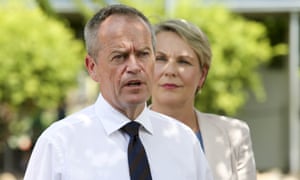Labour market expert believes opposition foreshadowing boost to minimum wage worth up to $80 a week for low-paid workers
He said the Shorten speech signalled a “much more aggressive approach to raising the minimum wage from a future Labor government”.
Lyons said Labor could be looking to change the rules on how the Fair Work Commission sets the minimum wage and to make a submission asking for an increase in line with union demands for the minimum to keep pace with the median wage.
“To the extent that Labor is now using the analysis that we ran with United Voice to get to a 60% minimum wage target or benchmark ... it’s a very important development,” Lyons said.
With federal parliament set to resume next week, the opposition leader has attempted to lay out Labor’s agenda for 2018, focusing on cost of living pressures and responding to voter disaffection about politics by promising a national integrity commission.
Shorten also signalled Labor was contemplating a pledge to stop the controversial Adani mine project and left open the prospect that an incoming Labor government would scrap the private health insurance rebate – picking a fight with the politically powerful sector.
Shorten’s pledge on the national integrity commission has won plaudits from two former judges who have lobbied for a federal anti-corruption watchdog and are now pressing Malcolm Turnbull to adopt it as bipartisan policy.
The chairman of Transparency International, Anthony Whealy, and Margaret McMurdo said that Labor’s policy was in line with the principles developed by a committee of judges and legal experts.
These included that the commission would be independent, have a broad jurisdiction and powers of a standing royal commission with one commissioner and two deputies, appointed on a bipartisan basis by parliament for one five-year term.
Shorten said on Tuesday the commission would cover the judiciary, commonwealth public service businesses and people who transact with the commonwealth and the governor-general.
“We’re hoping it becomes a bipartisan issue – that would be very good news for the community – not an election issue with one side proposing it and one resisting it,” Whealy said.
While Shorten’s comments on the integrity commission provided a clear model, some other elements of the speech lacked concrete detail.
Labor has identified wages stagnation as a problem it wants to address and contrasts its position with the Turnbull government’s repeated hints that it will offer workers a tax cut as a means of boosting the household balance sheet. Shorten on Tuesday did not specify how to he would adjust wages except noting the ALP would “have a look not just at the minimum wage but what is the living wage”.
“The current framework simply doesn’t give adequate consideration to contemporary cost of living pressures that working people are battling,” he said.
Adelaide University professor Andrew Stewart said it was unimaginable that Labor would take away FWC’s power to set minimum wages but there were “options within the politically feasible spectrum” including using commonwealth submissions to persuade it or changing the Fair Work Act to “direct or induce” it to give a higher pay rise.
While business will be nervous about repeated signals Labor has sent over the past 12 months about strengthening labour market regulation as part of its federal election offering, the Australian Industry Group chief executive, Innes Willox, gave a low-key response to Tuesday’s signal from the Labor leader.
Willox said the FWC independently sets the minimum wage and “takes into account a range of evidence”.
“In its latest decision the commission awarded an increase above CPI and above other wage outcomes,” he said.
In June FWC increased the minimum wage by $22 a week, or 3.3%. The ACTU has signalled it will call for a much larger increase – a living wage – because the current minimum of $36,000 a year would not pay for basic goods and services.
Shorten also issued a warning to private health insurers that “business as usual is not cutting it” and did not rule out changes to public subsidies.
The health minister, Greg Hunt, responded on Tuesday by warning that amounted to “a plan to dismantle private health insurance” and drive up the cost for pensioners, families and young people.
Hunt said the $6.4bn subsidy was means-tested and aimed at people who would otherwise be unable to afford private health insurance, meaning a cut could drive up wait times in public hospitals.
The chief executive of the insurer nib, Mark Fitzgibbon, said the sector shared Shorten’s goals of affordability, effectiveness and fairness.
He said the sector had “done reasonably well in recent years in keeping a lid on premium inflation” and was “all ears” if Shorten had ideas to further improve.

No comments:
Post a Comment